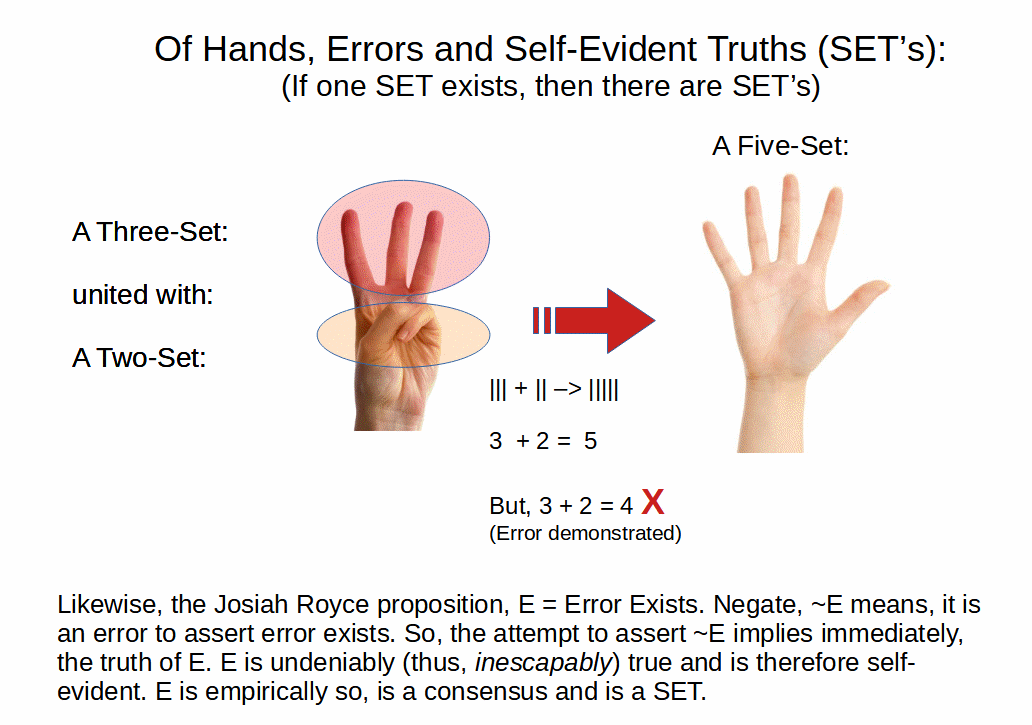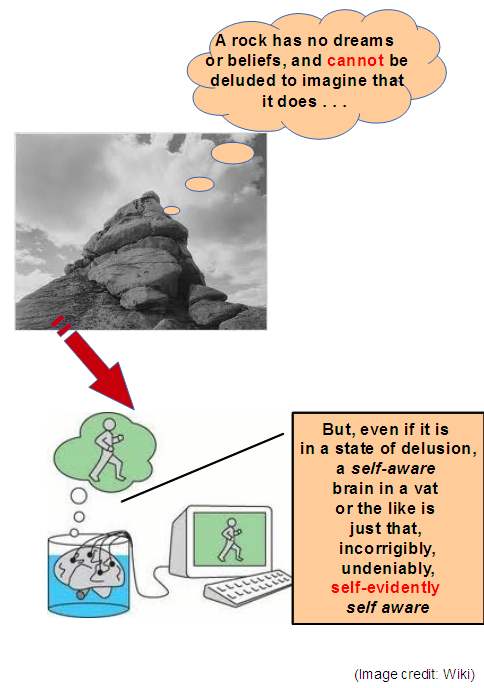A classic case in point of self-evident truth can be seen by splitting our fingers into a two and a three then joining them again — and, sorry, this needs to be hammered home hard as we are cutting across the grain of current education and cultural conditioning.
So, pardon demonstration by undeniable example and re-use of an illustration:

As a bonus, we see another SET that is like unto the first, self-evident, but is subtler. That error exists is not only a massive empirical fact but an undeniable truth. The attempted denial actually supports the Josiah Royce proposition.
By way of Epictetus (c. 180 AD), we can see a third case, SET’s that are first principles of reasoning antecedent to proof and which therefore inescapably pervade our reasoning, including proofs and [attempted] dis-proofs:
DISCOURSES CHAPTER XXV: How is logic necessary?
When someone in [Epictetus’] audience said, Convince me that logic is necessary, he answered: Do you wish me to demonstrate this to you?—Yes.—Well, then, must I use a demonstrative argument?—And when the questioner had agreed to that, Epictetus asked him. How, then, will you know if I impose upon you?—As the man had no answer to give, Epictetus said: Do you see how you yourself admit that all this instruction is necessary, if, without it, you cannot so much as know whether it is necessary or not? [Notice, inescapable, thus self evidently true and antecedent to the inferential reasoning that provides deductive proofs and frameworks, including axiomatic systems and propositional calculus etc. Cf J. C. Wright]
These examples and others that could be brought forward show that SET’s are true, and for one with adequate experience, background and insight to understand, will be seen as necessarily true once understood. That is, the attempted denial is in some way immediately, manifestly absurd so that the certainty of the SET is assured.
Thus, SET’s are objective, warranted to full certainty.
Which makes them suspect to those enamoured with today’s all too common relativism, subjectivism and emotivism. Clearly though if SET’s have been demonstrated — as we saw — then the claim or suggestion that truth is a perception or agreement or feeling regarding an opinion only . . . true to me or to us, that’s all . . . manifestly fails.
Starting with, 2 + 3 = 5 and with, error undeniably exists or that we are undeniably self-aware (conscious) and able to reason responsibly. Illustrating, by contrast with a rock (even one formed into computer hardware!):

However, as the Angelic Doctor long ago noted, having adequate background and inclination to understand and acknowledge the force of a SET can be an issue. Indeed, the case with Epictetus’ interlocutor shows that one may have to be educated to be able to understand a SET. (Recall, we have to be taught basic addition and multiplication facts.)
Epictetus also shows that one might have to be corrected regarding a SET. The silence in response suggests, too, that such correction may not be welcome.
For sure, self-evidence does not mean utterly simple and obvious to one and all.
We may now expand:
SELF-EVIDENT TRUTHS — CHARACTERISTICS:
1] A SET is just that, true, it accurately describes actual states of affairs, e.g. split your fingers on one hand into a 2-cluster and a 3-cluster, then join, you necessarily have a 5-cluster, || + ||| –> ||||| accurately describes a state of affairs.2] Further, a SET is understandable to anyone of appropriate experience and maturity to have formed the basic concepts and to therefore recognise the sentences expressing it.
3] A SET, is then recognisable as not only true but necessarily and manifestly true given its substance, though of course some may try to evade it or deflect it.
4] That necessity is backed up by a certainty mechanism, specifically that the attempted denial immediately manifests a patent absurdity, not by step by step reduction such as incomensurateness of the side and diagonal of a square, but blatant absurdity manifest on inspection.
5] Where such patent absurdities of denial may come in various forms, e.g.:
– Absurd incoherence or blatant error [ 2 + 3 = 4 X],
– undeniability [E= error exists, ~E is a claim it is error to assert E, so E is undeniable],
– inescapability [Epictetus’ interlocutor who tried to demand a logical proof of the necessity of logic . . . and — yes — the inescapability of appeals to the authority of Ciceronian first duties of reason, even in the face of an ongoing campaign to dismiss and sideline . . . to truth, to right reason, to prudence (including, warrant), to sound conscience, to neighbour, so too to fairness and justice etc . . . where, moral truths are truths regarding states of affairs involving oughtness, i.e. duty — we ought to respect the life, body, freedom and dignity of a young child walking home from school, never mind convenient bushes and dark impulses in our hearts],
– blatant self-referential absurdity [e.g. trying to deny one’s self-aware consciousness and the associated testimony of conscience or crushing of conscience],
– moral absurdity [trying to evade the message of the sadly real world case of a kidnapped, sexually tortured, murdered child]
– etc, there is no end to the rhetoric of evasion.6] So, SET’s are not private subjective, GIGO-limited, readily dismissible opinions or dubious notions. They are objective and in fact warranted to certainty backed up by patent absurdity on attempted denial. More than objective, they are certainly true, and especially as regards first principles and first duties of right reason, they are inescapably authoritative and antecedent to reasoned thought or argument.
7] Indeed, self-evident first truths and duties of reason are before proof and beyond refutation. The attempt to object or evade, inescapably, implicitly appeals to their authority in attempting to get rhetorical traction, and attempts to prove equally cannot escape their priority, the first truths and duties are part of the fabric of the attempted proof. So, we are duty bound to acknowledge them, to be coherently rational.
Of course, we are always free to choose to be irrational and/or irresponsible. And others are equally free to note the fact and duly reckon the loss of credibility. Where, cheap shot turnabout projections only confirm the loss of credibility.
As a final point, SET’s are relatively rare, so rare in fact that they cannot by themselves frame a worldview or school of thought. So, what we use them as is plumb lines that test our thinking, especially when we are tempted to make a crooked yardstick into our imposed standard for what political correctness, newspeak word magic, agit prop and lawfare call truth, right, rights, tolerance, conspiracy theories, follow the science, X-phobias, facts, knowledge etc. So, pardon another oldie but goodie:

Self-evident truths are important and precious. Let us therefore prize and use them aptly. END